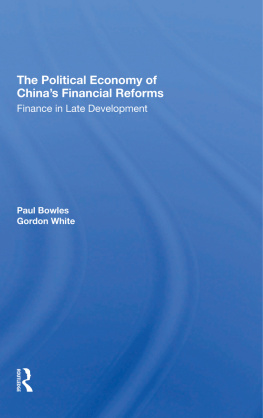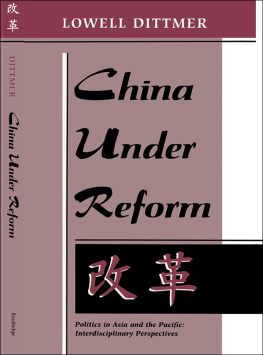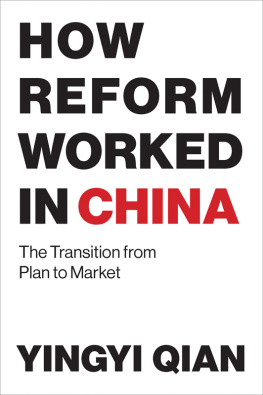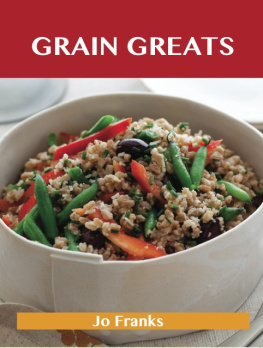ECONOMICS OF MARKETABLE SURPLUS SUPPLY
Economics of Marketable Surplus Supply
A theoretical and empirical analysis for China
Ping Zong
John Davis
Department of Agricultural and Food Economics
The Queens University of Belfast
First published 1998 by Ashgate Publishing
Reissued 2018 by Routledge
2 Park Square, Milton Park, Abingdon, Oxon, OX14 4RN
711 Third Avenue, New York, NY 10017, USA
Routledge is an imprint of the Taylor & Francis Group, an informa business
Copyright P. Zong and J. Davis 1998
All rights reserved. No part of this book may be reprinted or reproduced or utilised in any form or by any electronic, mechanical, or other means, now known or hereafter invented, including photocopying and recording, or in any information storage or retrieval system, without permission in writing from the publishers.
Notice:
Product or corporate names may be trademarks or registered trademarks, and are used only for identification and explanation without intent to infringe.
Publishers Note
The publisher has gone to great lengths to ensure the quality of this reprint but points out that some imperfections in the original copies may be apparent.
Disclaimer
The publisher has made every effort to trace copyright holders and welcomes correspondence from those they have been unable to contact.
A Library of Congress record exists under LC control number: 98070149
ISBN 13: 978-1-138-62459-7 (hbk)
ISBN 13: 978-0-429-46070-8 (ebk)
The core of this book is based on work carried out for Ping Zongs doctoral thesis which was completed in The Queens University of Belfast in 1997, under the guidance of John Davis. The authors are pleased to have this opportunity to disseminate the entire work more widely, especially in view of the current importance of the topics and issues which it covers. Grain production in China is a key focus of the countrys political economy. It is also an area of growing global interest and concern, especially over the likely future effects of Chinas population growth, industrialisation and further socio-economic reforms on the levels of her grain self-sufficiency and trade. It is probably fair to say that the Chinese government will continue to be highly interventionist in the grain sector. The authors believe that it is important to understand better how these interventions may influence the further development of the grain sector. The work reported in this book is concerned primarily with the possible effects of grain price changes on Chinese farm households grain marketable supply behaviour. Focusing on the reform period it adopts an economic modelling approach which attempts to take account explicitly of certain features of Chinese farm households and their environment; in particular their own grain consumption behaviour, and the dynamic interdependencies between these households and the rapidly evolving wider rural economy. Therefore, the book is ambitious in both its scope and remit and inevitably it leaves a number of issues which are inadequately covered and in need of further investigation. Nevertheless, the authors hope that it can contribute, in some small way, to the debate on these important issues. As always, with a book of this nature the material as presented frequently reflects a compromise in the styles and insights of the individual authors.
Ping Zong is a member of the Economics Faculty of Fudan University, Shanghai, China and at the time of writing was a graduate student in The Queens University of Belfast, Northern Ireland. John Davis is Head of the Department of Agricultural and Food Economics and Director of the Centre for Rural Studies in Queens University.
-/-
Dr Ping Zong, Dr John Davis
Department of Agricultural and Food Economics, The Queens University of Belfast, Newforge Lane, Belfast, Northern Ireland, BT9 5PX.
e-mail:
This book could not have been produced without the help, support and encouragement of a large number of individuals. We are particularly grateful to staff in the Department of Agricultural and Food Economics, The Queens University of Belfast, especially Dr Seamus McErlean and Dr Christos Papadas for their detailed reading and valuable comments on earlier drafts. We are also deeply indebted to Mrs Hilary McErlean for her professionalism and painstaking preparation of the final camera-ready copy. Mrs Pat Coulter showed enormous patience and stamina in proof-reading earlier drafts. Library staff, especially Mrs Elaine Davis and Mrs Diana Greer, were extremely efficient and gracious in obtaining a large number of articles and books, often at very short notice! We are thankful to Professor Zhili Chen who helped us to solve a number of difficult mathematical problems.
Since 1978, China has been engaged in systematic reform of its traditional centralised planning system through greater use of price incentives and the market system. A series of grain price reforms were introduced as part of the reform package. The main effect of these reforms was to increase the state grain purchase price, with the aim of stimulating grain production. The fact that the state purchase prices were depressed to an artificial level was regarded as the main cause of the disincentives and the poor performance of the grain sector before 1978. After initiation of the rural reforms, the raising of grain prices became a major element of the reform process. Meanwhile, the government also made significant efforts to eliminate inappropriate administrative restrictions and to allow markets more freedom to guide economic activities.
These reforms resulted in rapid growth of grain production during the period 1978-84: the average annual growth in grain output was 4.2 per cent in this period (Rural Statistical Year Book of China, 1994, p169). The growth in agricultural production, and grain in particular, during this period was remarkable. However, production dropped significantly after 1985. Despite further adjustments in state purchase prices, grain production was stagnant until 1990. The average annual growth in grain output dropped to 1.96 per cent in the period 1985-92; while the output of rural non-agricultural industries and other sectors of the national economy continued to grow rapidly (Rural Statistical Year Book of China, 1994, p169). This raises a question about how China can achieve sustainable growth in grain supply through reliance on price incentives: more specifically what are the factors which influence supply response behaviour of farm households to grain price changes. There are many studies about grain price adjustment policies during this period, and debates are never ceasing (see Sicular, 1989, 1990, 1993; Claude, 1990; Ash; 1993; Cheng, et al. 1994; Gao, 1989). Grain price policy has become one of the most controversial issues in China over the last decade. Analysis of farm households supply response to price policy changes has become an urgent task for agricultural economists.
A rigorous theoretical and empirical exploration of their production motivation and behaviour is needed. Improving our understanding of these factors should contribute to the development of a better framework for future grain price reforms and more informed policy choices.







